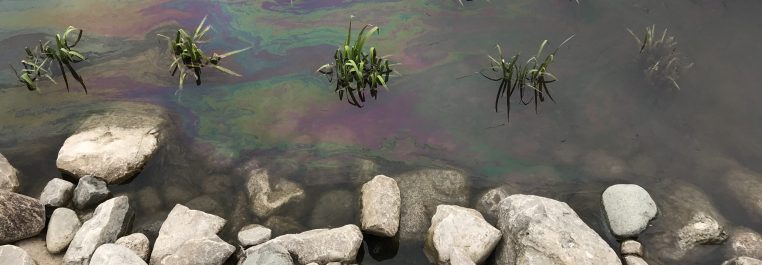Pollution prevention
Mississauga’s stormwater system does not include water treatment like the sanitary sewer system. Everything that goes into the storm sewer system ends up in the natural environment.
Rainwater and melted snow from roads and properties goes into catchbasins and local creeks that flow to Lake Ontario. Mississauga and other communities take our water for drinking and other uses from Lake Ontario. So preventing stormwater pollution from entering the lake is very important.
Stormwater runoff should be made up of only rainwater and melted snow. It can be easily polluted by substances like:
- Car soaps
- Soil, grass clippings and yard waste
- Antifreeze and other fluids from cars
- Chemicals
- Oils and lubricants
- Cigarette butts
- Litter
- Pet waste
- Cooking oils and greases
- Leaking fluids from dumpsters
- Dyes, solvents and paints
- Plastic pellets
If these pollutants mix with the stormwater runoff as it flows across driveways, properties and roads into catchbasin inlets, these pollutants can quickly flow into local creeks before ending up in Lake Ontario.
We all can help to reduce stormwater pollution in our Great Lakes and protect our water and our community by:
- Cleaning up pollutants
- Choosing non-hazardous materials and safe disposal options
- Reporting and preventing spills and discharges
Learn more about how the City is reducing stormwater pollution and protecting the City’s stormwater system.
- Keep yard waste in appropriate containers away from roadside catchbasins
- Wash your vehicles at a car wash. This helps ensure water containing dirt and cleaning products flows into the sanitary sewer for treatment.
- Avoid washing carpets, outdoor furniture and other items on the driveway. Soaps, detergents and cleaning products flowing into catchbasins harm water downstream.
- Maintain your car regularly to make sure engine fluids are not leaking. Clean up any spills or leaks promptly.
- Dispose of chlorinated and salt water pool wastewater safely. For more information check the Pool Water: Safe Water Practices for Pool and Spa Owners.
- Vacuum, sweep, and use rags or dry absorbents on your driveway to control spills instead of hosing it down. This runoff goes into the nearest roadside catchbasin and then into the environment.
- For your garden select native plant species and plants that need less fertilizer to minimize polluted runoff
- Avoid over-spraying pelletized fertilizers onto driveways, sidewalks and the roadway
- Apply lawn and garden chemicals sparingly and according to directions
- Keep litter, pet waste, leaves and debris out of street gutters, storm catchbasins and ditches
- If you’re completing renovations, make sure your contractor disposes of any liquid construction waste according to the Storm Sewer Use By-law and provincial waste regulation 347. Never discharge polluted water into catchbasins.
- Follow manufacturer’s instructions when applying ice control chemicals. Shovel and scrape snow and ice first.
- Dispose of cigarette butts safely in a designated spot
- Dispose of all food and beverage wastes either as solid waste for curbside pick-up or liquid waste into the sanitary sewer system
- Use the Region of Peel’s Community Recycling Centres to dispose of hazardous waste like used oil, antifreeze, paints or other household chemicals
If you’re a business owner, preventing pollution can help protect you from litigation, fines and expensive clean up costs.
- Comply with the Storm Sewer Use By-law at all times
- Understand how drainage flows out on your commercial/industrial property and maintain your private drainage system properly
- If your business produces liquid waste, you must follow applicable federal, provincial and municipal requirements. Liquid wastes cannot be discharged into storm drains or the storm sewer system.
- Create a pollution prevention plan if your business involves any type of material that could cause a spill. The plan should detail the material handling, storage and movement of materials to prevent spills.
- Create a spill response plan in the event liquid materials or wastes spill on your property
- Keep all catchbasins and drains clear of litter and debris as part of your maintenance program
Learn more about reporting and preventing spills.
Storm Sewer Use By-law
The Storm Sewer Use By-law sets strict limits on what can be discharged into the stormwater drainage system. Any substance other than stormwater can harm the environment and damage the storm sewer system.
The by-law lists pollutants that can damage the natural environment and the storm sewer system. Private drainage systems typically connect to the City’s storm sewer system and must be maintained by the property owner. The pollutants listed in the by-law also apply to any private drainage system that discharges to the City’s system.
If an individual or a company violates the Storm Sewer Use By-Law, they can be liable for cleanup, repair costs and fines.
If you want more information, or if you’ve seen an act that may not comply with the by-law, please contact 311 (905-615-4311 outside City limits).
